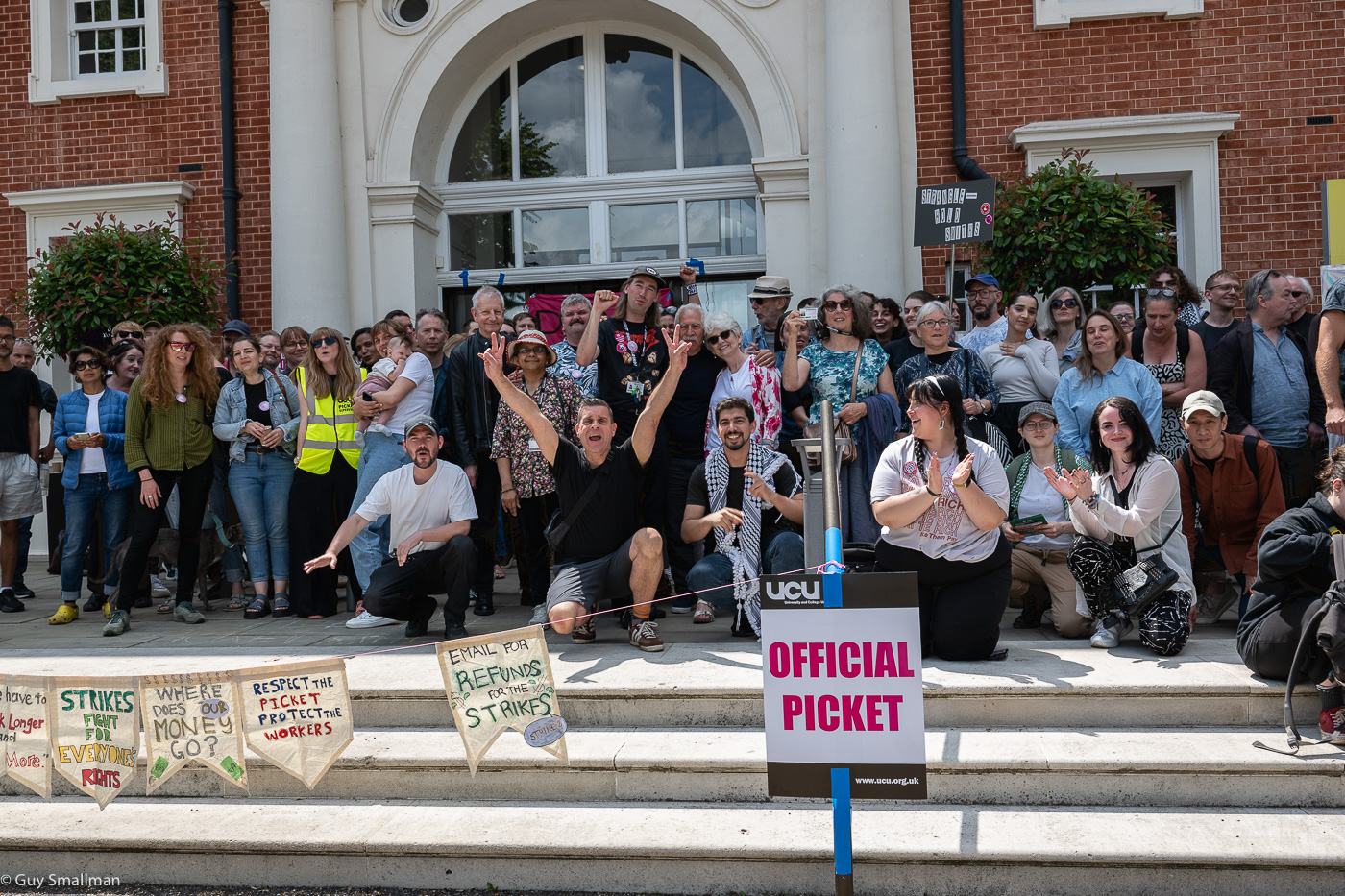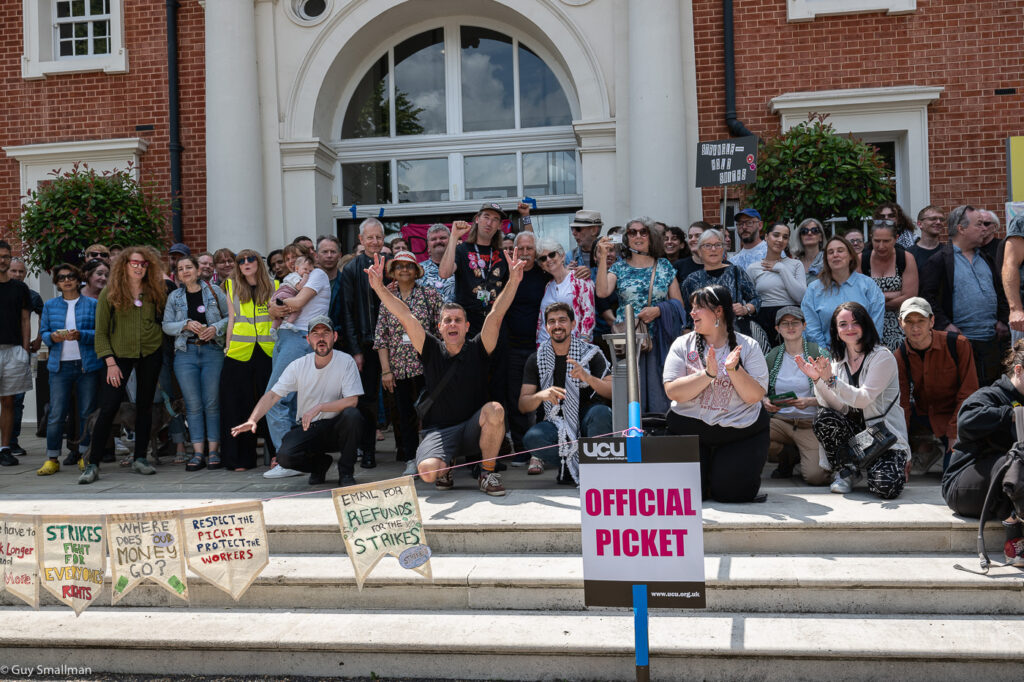On Thursday 16 August 2024, Goldsmiths UCU reached a negotiated end to our recent dispute with Goldsmiths SMT.
Included in this agreement was a guarantee of no compulsory redundancies for staff who remained at risk of redundancy as a result of the Transformation Programme; maintaining the Associate Lecturer budget for academic year 2024/25 at the level of academic year 2023/24; a guarantee of no compulsory redundancies in academic year 2024/25 for all staff; and a commitment to work with GUCU on delivering mutually-agreed equality and diversity issues. In return for these commitments GUCU agreed to end our dispute, lifting the marking and assessment boycott and halting planned industrial action for the 2024/2025 academic year, which included an indefinite strike from September 2024.
This agreement, which resulted in our branch defending the jobs of 11 members of staff, followed several months of brutal and oftentimes hostile negotiations, consultation meetings and reams of written correspondence between Goldsmiths Senior Management, Change Managers and members of our branch including GUCU executive officers, caseworkers and many active branch members from October 2023 through to August 2024. During this time we saw 66 staff members leave Goldsmiths through a Voluntary Severance Scheme launched in January 2024, 62 members of staff take up a COT3 settlement agreement and enhanced redundancy package under threat of redundancy, and numerous staff members accepting redeployment roles, retiring or resigning. In the most vicious attack on academic teaching staff the College has ever seen, which was shockingly attempted alongside a far-reaching restructure involving several concurrent ‘work streams’ all initially due for completion within one academic year, our branch has been nothing but heroic in its steadfast and unremitting obstruction of SMT’s plans.
Context
In an all staff email on Monday 30 October 2023, Goldsmiths’ Warden Frances Corner announced that the college faced an approximate £16 million budget shortfall as a result of failing to meet recruitment targets across all cohorts. The shortfall was framed as putting the College at risk of falling beneath the 30-day operational cash flow benchmark set by the Office for Students, as well as breaching the controversial Natwest and Lloyds Bank loan agreements which had triggered the previous round of redundancies at Goldsmiths in 2021/22 as part of the Recovery Programme. Over the following months the desired savings figure yo-yoed, settling at a figure of £13.1 million, which was then used to justify a savings target of £20 million in January 2024.
Alongside this, the college undertook a Voluntary Severance Scheme (VSS), sought vacancy savings through the non-replacement of staff, initiated a hiring freeze and allowed many Fixed-Term contracts and Associate Lecturer contracts to expire with no prospect of renewal (referred to collectively as Workstream 1 within the Transformation Programme). GUCU maintained a number of red lines throughout this period as we polled membership and prepared for a ballot in the increasingly likely event that management would escalate their attack on the workforce to secure greater savings, reshaping the university staffing profile and culture more broadly. Our red lines included no compulsory redundancies, no non-renewal of fractional and associate lecturer contracts, and an administrative audit of the previous restructure to be undertaken before any further restructuring was implemented.
At no point were the banking covenants breached and cash reserves at the college began to swell. In fact, at £51 million by August 2024, reserves were nearly five times above the OfS 30-day benchmark. Clearly the funding model of Higher Education, dependent on student fees and recruitment growth since the Browne Review of 2010, is utterly flawed and does indeed suggest an impending crisis within the sector. However, at Goldsmiths the familiarity of the financial narrative as one of catastrophic precarity has been regurgitated every year – first as Evolving Goldsmiths in 2019/20, then as the Recovery Programme in 2021/22, and finally as the Transformation Programme in 2023/24. This is indicative of an ideological driver that instrumentalises restructures towards ever increasing savings targets, bloated management structures, and an orientation towards ‘STEM’ subjects that diminishes key arts and humanities subject areas such as English and Creative Writing, History, Music, and Sociology.
Redundancies
Goldsmiths Senior Management served campus trade unions notice of their plans to slash up to 132 full time academic posts as part of Workstream 6 of its Transformation Programme on Wednesday 28 February 2024, affecting 11 out of 19 departments across the College and placing over 300 members of academic staff in scope of the redundancy process. Goldsmiths UCU opened a ballot for industrial action on Thursday 1 March which resulted in 87% of the branch voting yes to strike action and 92% to take action short of a strike (ASOS), on a 69% voter turnout. The branch adopted a number of campaigns as part of our fightback against this attack including our strongest marking and assessment boycott to date, a two week strike in June, a national academic boycott (‘Greylisting’) of the university and notice of an indefinite strike, which was set to begin on the first day of the new academic year in September – following a successful reballot in July 2024 with 86% of members voting for strike action and 89% voting for ASOS on a 62% voter turnout.
Our work to disrupt SMT’s redundancy process would have been impossible without the recruitment and support of over 60 caseworkers, largely drawn from departments that were not in scope of cuts to support those that were, and led by the exemplary work of key members of our branch who shared knowledge and experience around previous casework precedence, employment law, and grievance processes. Critical to this work was the knowledge sharing and assistance provided by branch members around equalities specific concerns, an area the college’s senior management team scandalously and repeatedly fails in its commitments to uphold, specifically around the intersections of race, disability, gender and contract precarity. However, these collective efforts were frustrated by the way in which SMT managed the Transformation Programme, including making changes to processes and criteria without consultation and providing limited guidance and information to staff at risk of redundancy, as well as hosting outdated and inaccurate timelines and guidance documents.
This dispute saw our branch undertake an incisive media campaign to intensify the pressure and scrutiny on College Senior Management, with widespread coverage in major news platforms such as Guardian, The Times, The Mirror, Times Higher Education, Evening Standard and Al Jazeera news, with particular emphasis on the targeting of subject areas and staff involved in key areas of study that threatened the equalities commitments of the College, including MA Black British History, MA Queer History, MA Black British Literature, and MA Human Rights, Culture and Social Justice, to name but a few.
We also engaged in a number of rallies connecting the impact of the redundancies and restructure that aimed to fundamentally change Goldsmiths with the local community, working with other trade unions such as IWGB, Lewisham NEU, Lewisham UNISON and local activist networks campaigning around racism, immigration and outsourcing, in order to link up our struggles as part of a wider fightback against increasingly draconian attacks on worker rights and community solidarity. Finally, our fundraising efforts were critical to bolstering our industrial action against punitive management deductions for both MAB and strike action; our art raffle, solidarity fundraiser events and cross-branch fundraising helped us to boost morale and secure over £60,000 to ensure that no one would be turned away from hardship experienced through these deductions.
Our fight has been inextricably linked to the incredible student-led actions on campus, and the efforts of Goldsmiths Student Union. Goldsmiths for Palestine (G4P) held three occupations of the Professor Stuart Hall Buidling, the Library and Goldsmiths Centre for Contemporary Art (CCA), to hold management to account for its complicity in the ongoing genocide in Palestine. In response to the Transformation Programme, Students Against the Transformation Programme (SATP) occupied Deptford Town Hall and, through the Student Union, mobilised students to take part in a referendum – with 98.91% of those participating voting no confidence in the Warden. The unity and solidarity shown by staff, students and colleagues from other UCU branches was instrumental in winning concessions from management.
Closing the dispute
In the weeks leading up to our dispute resolution agreement, an increasingly intransigent management team attempted to compel the branch to sign away our trade union rights and preposterously commit to no industrial action over the academic year 2024/25 – an ultimatum designed to discipline and disempower workers amidst further brutal restructuring at the university. The outcome of this dispute is bittersweet. We fought relentlessly and retained the jobs of 11 staff members whilst remaining intact as a branch and vigilant, prepared to take action should the need arise.
However, we cannot ignore the fact that 62 of our colleagues and comrades were pressured to accept an enhanced redundancy package, a further 66 left as part of a Voluntary Severance Scheme, many others resigned as well as those employed on precarious fixed-term or Associate Lecturer contracts that were not renewed. In addition, at least three dozen staff members accepted redeployment roles on fewer hours and/or worse employment terms, and a number of others reduced their hours in an attempt to save jobs.
For staff of colour who were impacted by the redundancy processes, management’s callousness served to compound experiences of marginalisation and structural racism, in addition to the attacks on teaching focused on race, gender, sexuality, disability and class. Affected colleagues supported critical learning essential for tackling race and social justice, and their knowledge and experience will irreparably impact areas including, but not limited to: MA Race, Media & Social Justice; Centre for Postcolonial Studies; MA Photography & Urban Cultures; MA Queer History; Centre for Urban & Community Research; In Living Memory; Centre of the Body; MA Social Justice in Education. Vital programmes such as the MA Queer History, the only one of its kind, have been axed as a result of this disastrous and completely unnecessary programme of redundancy. These huge losses are acutely felt by all who remain at Goldsmiths, and the full impact of the Transformation Programme will only be understood in the coming academic year. Although we ended our dispute with a commitment from the College to work with GUCU on delivering mutually-agreed equality and diversity issues, at the time of writing no progress has been made on these terms.
We also must acknowledge a number of the key architects and actors forcing through the Transformation programme who scuttled away throughout the year; Jilly Court (Chief Operating Officer departed in December 2023), Susan Edwards (Director of POD, who left at the end of May 2024), Ernest Caldwell (Pro-Warden Education and Student Experience left at the end of September 2023 after only one year in the role and before he could see through the full impact of his area of oversight – Workstream 2 and 3: Academic Faculty Restructuring, and the Portfolio Enhancement and Simplification programme) and Gavin Barber (Academic Registrar, who left at the end of October 2024). The pernicious work of these individuals will not be missed at our college.
We extend our deep gratitude to the students, comrades and trade union branches who joined our pickets, donated to our support fund, attended our fundraisers, participated in the art raffle, signed our petitions, made statements of support, and amplified our struggle. It has been a collective fight and any achievements gained are shared achievements. We will continue to fight for better working conditions, and address the longstanding racism and discrimination that blight the college, through all the pathways available to us. Our agreement does not foreclose future disputes and we end this dispute with more knowledge, experience and certainty of the struggle ahead.
In solidarity,
GUCU executive committee

